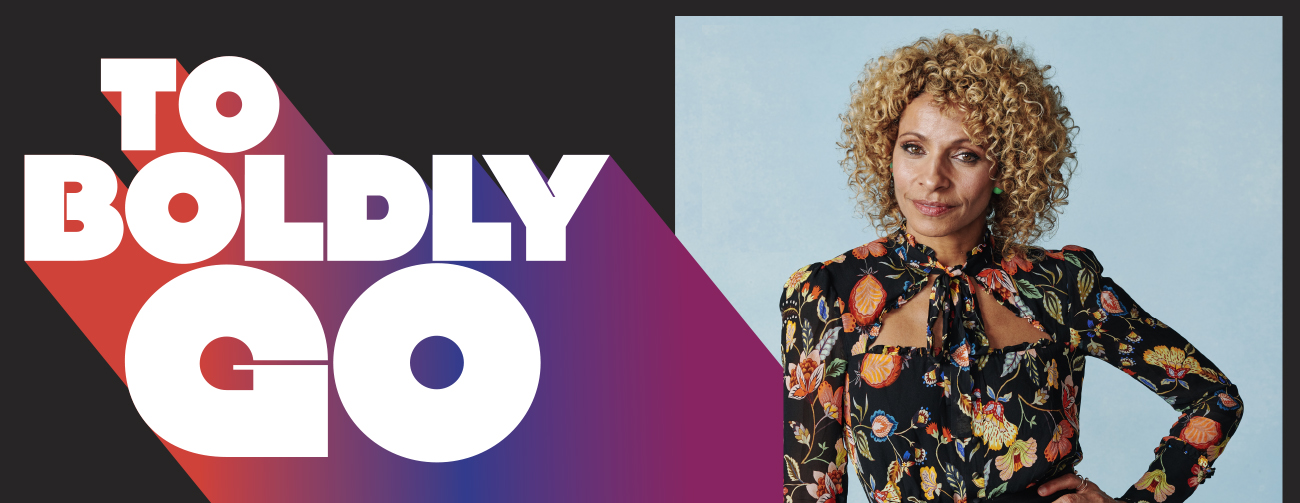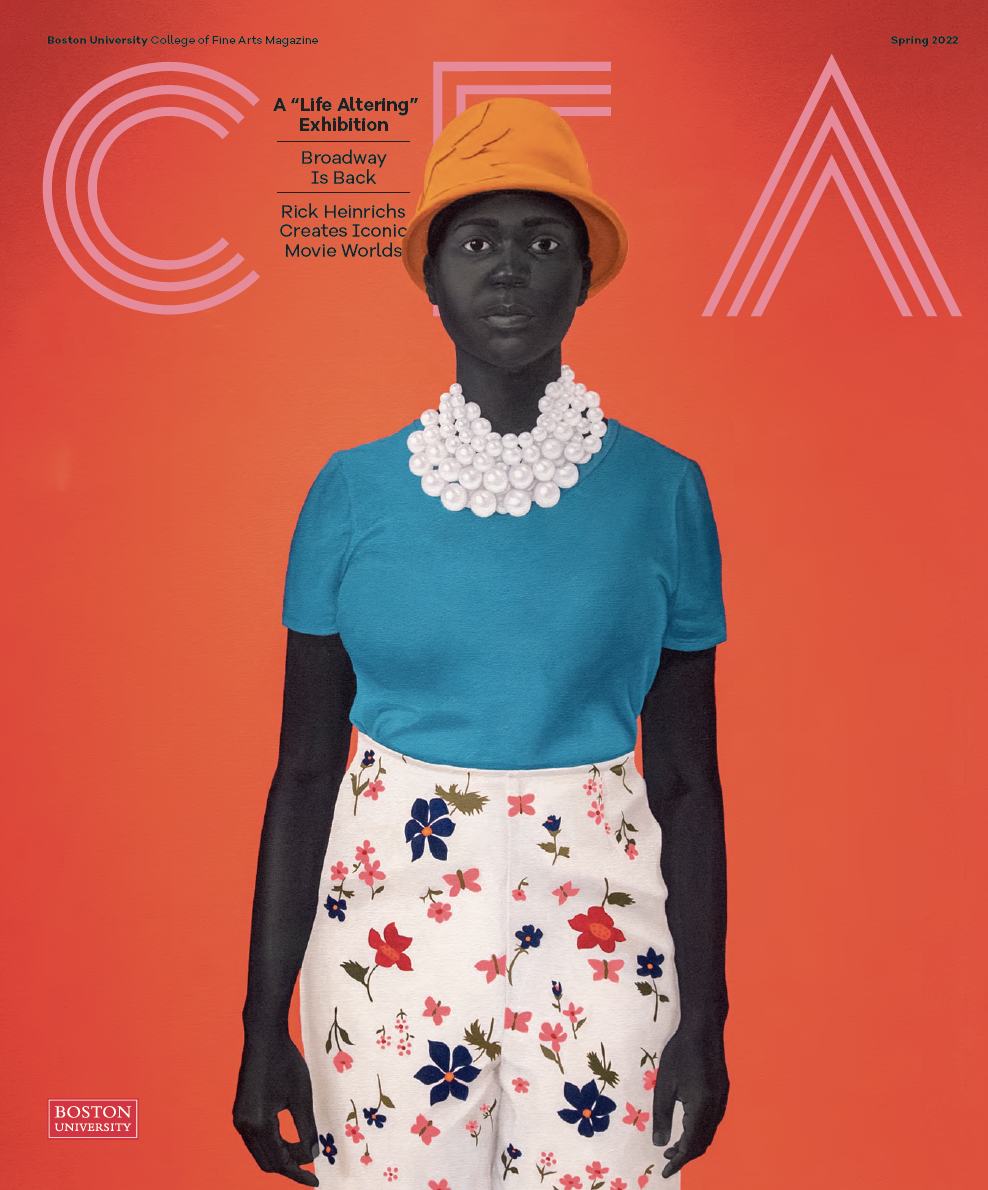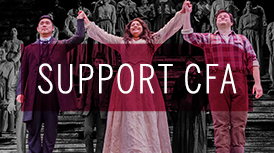To Boldly Go
Actor Michelle Hurd on Star Trek, Law & Order, and continuing her father’s fight for equity in Hollywood
By Marc Chalufour | Photo by Cara Robbins/Contour by Getty Images
See this article on CFA magazine’s new home at bu.edu/cfa/magazine!
Not a day goes by without a stranger on the street spotting Michelle Hurd and shouting “Law & Order!” Despite roles on dozens of high-profile shows—including ER, Gossip Girl, and Daredevil—Hurd (’88) remains best known for playing Detective Monique Jeffries on the first two seasons of Law & Order: Special Victims Unit. But even the ubiquitous police drama, now entering its 24th season, can’t rival the franchise that Hurd recently joined: Star Trek.
Hurd plays Raffi Musiker, a former Starfleet colleague of Jean-Luc Picard (Sir Patrick Stewart), whom he recruits for a new mission on the Paramount+ show Star Trek: Picard. The show, which premiered in 2020, continues the story of Star Trek: The Next Generation, and joins 13 feature films and 10 television series in the franchise that first transported viewers to other worlds in 1966.
For Hurd, it’s the role of a lifetime. She still recalls watching the original Star Trek with her family and appreciating its message of diversity and acceptance. It’s a message that hasn’t always matched her experiences as the daughter of a white mother and Black father. Hugh Hurd, her father, was an actor and civil rights activist. He starred in John Cassavetes’ first film, Shadows, raised funds for Martin Luther King, Jr. (GRS’55, Hon.’59), and cofounded the Committee for the Employment of Negro Performers, which helped spark a congressional hearing on discrimination in the entertainment industry. Merlyn Hurd (’55), her mother, was also an actor before becoming a psychologist. Following in her father’s path onscreen as well as off, Hurd has been active with diversity and equity efforts within the Screen Actors Guild–American Federation of Television and Radio Artists and serves on the global leadership board for Time’s Up, which promotes workplace equity for women.
After lengthy pandemic-related delays, season two of Star Trek: Picard is back in production and is scheduled to premiere in February 2022. Hurd spoke with CFA during a day off from shooting.
CFA: What characterized your time at BU?
Hurd: I didn’t understand why certain roles were given to certain types of people. I wanted to play Juliet, not just play the nurse. So I was a bit of a rabble-rouser because I played every different ethnicity in college and all I could think was, “I’ve got no problem playing a minority—I’ve got that down.” But I was there to try to play parts that I would not otherwise have the opportunity to play. That definitely made me a driven actor. Once I graduated, I was really hungry and aggressive and ready to tackle anything.
Were there roles that you had to fight to be considered for that you got?
That I got? [Laughs] I definitely fought for roles, but it was a different time. I played all these ethnic characters. I remember they brought in an outside director for A Midsummer Night’s Dream, and I was so excited to give my best Titania monologue—and he cast me as Hippolyta. I asked him, “What made you think to cast me as a Hippolyta?” And he said, “Oh, well, when I had done some research, I found that Hippolyta was referred to as the Black Moon.”

Isa Briones, Sir Patrick Stewart, Michelle Hurd, and Evan Evagora attend the Star Trek: Picard fan screening at Zoo Palast on January 17, 2020, in Berlin, Germany. Tristar Media/Getty Images
Your father was a civil rights activist as well as an actor—what do you remember about his work?
My godfather, Godfrey Cambridge, was also an actor, and Maya Angelou was a friend—they all worked together in an acting company. It was a normal thing to see them in our living room, talking about civil rights issues and injustices. I grew up knowing that there was inequity and knowing that to be an artist, as a person of color, was going to be challenging. It’s why I do so much committee work now and I work as hard as I can to create equity in the rooms that I walk into.
What has or hasn’t changed since your father’s career?
There have been huge steps. Every day that I’m on set, I think how proud my father would be. Tears would well in his eyes to know that his daughter is working with Patrick Stewart on Star Trek. And I do think that women and people of color are getting seen more, our stories are being told.
It’s imperative for our youth to see themselves represented in the arts, because then they’re included in the world. I’m a Jane Austen fan, and when I read Jane Austen I see myself in it, I visualize myself. But if I watch a classical version, I don’t see myself. Recently, I’ve been watching Bridgerton, and it’s kind of amazing how the guilt is lifted. I’m allowed to enjoy it because I see myself represented. In that case, there have been great strides.
But systemic change happens behind the camera. We need people of color in our writers’ rooms, producing, directing, and on our camera crews. And not just people of color, but LGBTQIA+, disabled, and neurodiverse individuals. When we have everybody in the room, our conversation grows and our stories get more exciting and interesting. We have a long way to go there.
Are you in a position to push for those changes?
This season, I said, “OK, I’m on a really good show. I have a little bit of power. What can I do?” And I was able to talk to our producers about hiring people of color for the hair and makeup room. We had a Black guest on the show and she said, “I came to the studio today like I do every job, with all my hair and makeup stuff in my car. When I walked into the makeup room and I saw a woman of color, I realized that I could sit back and be treated like everybody else on the set.” So we’re making strides.
That’s a good transition to Star Trek: Picard. What appealed to you about your character, Raffi Musiker?
What did not appeal to me! There is something so flawed about her. She’s not perfect, she’s had issues, she has crutches that she’s going to be leaning on. She’s a real human. And I’m saying lines that [showrunner and writer] Michael Chabon has created for me. It’s a blessing.
Were you a Star Trek fan before landing this role?
My parents were civil rights activists and me and my sisters are biracial. When we would watch television, it was really important to my father that his children see themselves represented. Star Trek was the one show that we would all sit down and watch. Every episode was about inclusion and diversity and the world trying to deal with people who are blue. How do we interact and how do we make a cohesive world? I want to have that same sort of impact on kids now. It’s one of the reasons I told my producers that I want Raffi to always have this huge mane of unruly hair. I want kids who look like me to see that curls are still in, in 2400.
Watch: Michelle Hurd and her Star Trek: Picard costars discuss how respect for the franchise’s fans informed the show. Courtesy of IMDb
You’ve been on a lot of popular TV shows that have passionate audiences—how does Star Trek compare? What appealed to you about your character, Raffi Musiker?
You usually do a pilot and you put it out there and you have no idea if anybody’s going to watch it. But Star Trek has a built-in family. It’s overwhelming how passionate, committed, warm, and welcoming the fans are. What’s so beautiful about Star Trek is it gives a platform to people who feel like they haven’t been seen. You reach people from every walk of life, every shade, every ability and disability. And then they find their voice and they reach out to say, “Thank you.” It really makes me want to do good by them.
There’s nothing quite like this show and this family. It’s a beautiful experience.
“What’s so beautiful about Star Trek is it gives a platform to people who feel like they haven’t been seen.”
CBS and Paramount have used Star Trek shows to anchor their Paramount+ streaming platform. Does that shift away from traditional network and cable television affect you as a performer?
Absolutely. When you think about old-school Law & Order, we did 24 episodes a season. A lot of times there would be a few episodes that were filler. Now, all of a sudden, we have this whole new format and we’re doing 6 or 10 episodes. That’s like a great short book. We can give you this impactful story and hopefully make you want more. It’s a different thing from when I first started in this industry.
You spoke earlier about the roles you didn’t get at BU. Is there a role you’re still eager to play?
I’m still waiting for Titania. [Laughs]
I wish I had a better answer. I’m not interested in playing the girlfriend, the wife, the pretty person. I’m really interested in telling true, flawed individuals’ stories, and in making people who don’t often see themselves represented be seen. I want to continue to empower women of color and women of a certain age and make sure that there’s a strong voice for women out there in the arts.










